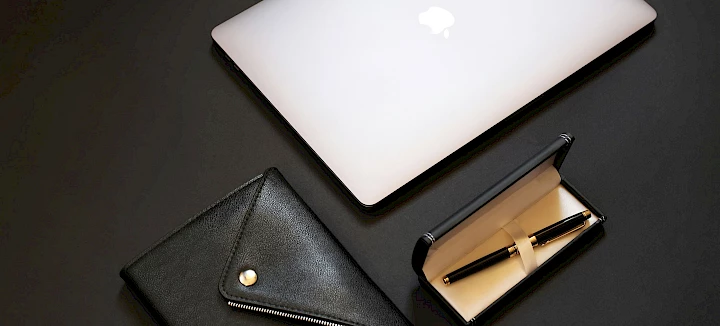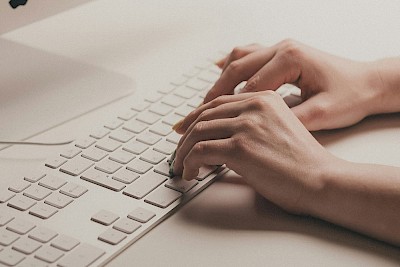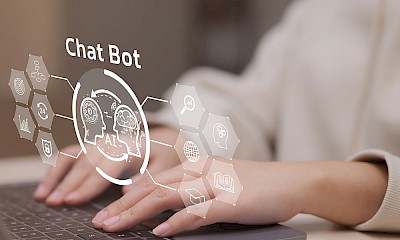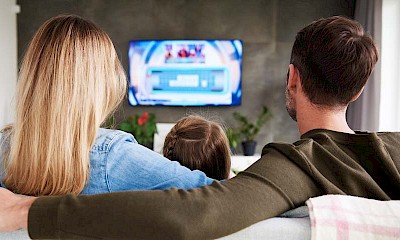
AI and copyright: What to consider legally when using AI-generated content
Today, artificial intelligence generates images, texts or music at the touch of a button - and thus calls into question well-known rules of the creative industry.
Who is the author of an AI image? Is training with protected works permitted? And how can creative protection be secured when machines generate content?
The interplay between AI and copyright raises many unanswered questions. We shed light on key points of contention, legal gray areas and current developments in a dynamic field of tension.
Disclaimer: Information on AI copyright
The following content does not constitute legal advice. They are for general information purposes only. For a legally binding assessment on the subject of AI and copyright, please contact a suitably qualified lawyer.
Please note: The legal situation in the field of AI and copyright is changing. The information presented here is current as of June 2025 and may change at any time.

Table of contents All questions about AI and copyright at a glance:
- How does the generation of creative content by an AI work?
- Am I the author of my AI-generated content?
- Can my text input be protected?
- Use of pre-existing works as training data: Limitation rule
- AI copyright: Can a generated work infringe third-party rights?
- AI & copyright: Do I have to label AI content?
- Can I sell or monetize AI content?
- AI copyright: How do I become the author of my AI content?
- Conclusion: AI and copyright
- FAQ - Frequently asked questions about AI copyright
The most important facts about AI and copyright in a nutshell:
AI can't hold copyrights – Only humans are legally recognized as authors.
Training data under scrutiny – Using protected content to train AI is legally disputed.
AI outputs may infringe rights – Especially when mimicking styles of copyrighted works.
Users share responsibility – Publishing AI-generated results requires a legal check.
Labelling may become mandatory – Marking AI content could soon be required by law.
Businesses need clear policies – Internal guidelines and IP checks help reduce risks.
How does the generation of creative content by an AI work?
Artificial intelligence is able to deliver seemingly creative content because it works on the basis of large, machine-readable training data sets. These data sets consist of extensive collections of texts, images, pieces of music or other digital content that were previously created by humans. Artificial intelligence analyzes these data sets and learns patterns, structures and correlations in the process.
In so-called generative models - such as text or image AIs - this analysis is used to generate new content that is statistically linked to what has been learned. There is no "creation" in the classic, copyright sense. Rather, it is an automated combination, variation, continuation and duplication of learned patterns.
Artificial intelligence therefore does not create anything in the true sense of the word - it performs computational operations based on existing training data sets. The impression of creativity is created by the fact that the results appear surprising, coherent or stylistically convincing to humans.
In the context of AI and copyright, it is therefore crucial that such automated content creation would not be possible without extensive data sets as a basis. The "creativity" of artificial intelligence is always a reflection of the content with which it has been trained - and not an expression of original creation.

Visibility rethought: Become the answer to AI-driven search queries
Artificial intelligence is changing the search behavior of your target group! We make sure that you are just as present in classic search results as in the responses of modern AI systems.
Am I the author of my AI-generated content?
According to the current legal situation - in particular the German Copyright Act (UrhG) - authorship requires a personal intellectual creation. Only a person who independently and creatively creates a protected subject matter can legally be considered an author and claim corresponding intellectual property rights.
In the context of AI and copyright, this means that machine-generated content is based on the automated utilization of large training data sets and is the result of statistical processes, not the result of an individual intellectual achievement. There is therefore no creative act in the sense of copyright law.
As a result, such content does not generally enjoy copyright protection and no claim to legal authorship can be made. Although use is generally permitted, it lacks the scope of protection and exclusive rights that exist for works created by human beings.

Can my text input be protected?
Whether a prompt is subject to copyright protection depends on whether it constitutes a protectable human creation. Mere commands or technical instructions are generally not sufficient. Only if there is an intellectual creation in the sense of copyright law - for example through original expression - can protection be considered. The debate on AI and copyright therefore also raises the question of whether and to what extent user texts (prompts) themselves are relevant under copyright law. The legislator has not yet made any specific provisions in this regard. In practice, however, protectable prompts or specifications tend to be the exception.
Use of pre-existing works as training data: Limitation rule
The Copyright Act permits the use of protected content for training purposes through the text and data mining (TDM) limitation rule - but only if the conditions are met and there is no reservation of use. Without express permission for reproduction by the rights holder, use is nevertheless controversial and has not been conclusively clarified in legal terms.
LAION case: a precedent for AI and copyright in Germany
In the first German AI copyright case, photographer Robert Kneschke filed a lawsuit against the LAION association. LAION had included one of his images in the publicly accessible LAION-5B training dataset, which is used to train AI models. Kneschke saw this as an infringement of his copyrights and filed a lawsuit.
The Hamburg Regional Court dismissed the action and ruled that LAION's actions were covered by the limitation provision of Section 60d of the German Copyright Act (UrhG). According to this provision, the use of copyrighted works for scientific text and data mining is permitted as long as there is no reservation of use.
The case illustrates how issues relating to AI and copyright actually play out in court. The classification of AI-related acts of use as scientific research by the regional court could be groundbreaking for the further legal assessment of generative AI in Germany.

Technological change needs strategic marketing
Whether texts, images or campaigns - we help you use AI-generated content in a targeted manner and tailor it optimally to your target group. For more reach, relevance and digital visibility.
AI copyright: Can a generated work infringe third-party rights?
Infringement is possible in theory, but very rare in practice. An AI model could generate content that is strongly correlated with existing copyrighted works and is too similar to them.
However, modern generative AIs do not copy directly, but combine training data to produce new results. A coincidental match with protected works is therefore extremely unlikely - but cannot be completely ruled out.
What are the consequences of using AI content on my website?
AI-generated content is generally not subject to copyright protection, as it is not the result of personal intellectual creation. This means that content may be legally exploited and published - but there is no subject matter that could prevent third parties from using it
Consequence: Others can use the same or very similar content without any problems. If a competitor enters the same specification (prompt) into an AI system, the result can be almost identical - without any legal recourse. There is no exclusivity, as would be the case with individually commissioned texts or designs. This makes it clear what practical effects the tension between AI and copyright can have in everyday life.
Even if AI systems do not usually generate exact copies, there is a theoretical risk of copyright infringement. If content is generated that is strongly correlated with existing works, copyright infringements may occur.
Example: An AI-generated logo is similar to a protected trademark - the rights holder can demand a warning, injunction and compensation. Images that are unintentionally reminiscent of well-known works in terms of style or content can also be problematic.
Careful handling of sensitive content and potentially protected templates is therefore essential, particularly in the context of AI and copyright.
Even if there is no human author involved, responsibility for the content does not cease. Anyone who embeds generated texts, images or other content on a website is fully liable for any infringements.
Example: An automatically generated job advertisement that violates the General Equal Treatment Act (AGG) can have consequences under labor law and reputational consequences. The same applies to discriminatory or factually incorrect statements.
For agencies, this means in the context of AI and copyright: AI-generated campaigns or graphics can be provided to customers for use, but without a legally secure right of use vis-à-vis third parties. The customer receives a simple right of use, but cannot prevent others from using the same content.
Consequence: Parallel use by competitors is legally permissible, provided that no third-party property rights have been infringed. This can lead to irritation on the part of the customer if no clarification is provided at an early stage.
AI & copyright: Do I have to label AI content?
There is currently no statutory labeling requirement - at least not across the board. However, in special contexts (e.g. political advertising, journalistic content), transparency is increasingly required, particularly with regard to the origin and creation of the content.
From a compliance and consumer protection perspective, voluntary labeling is recommended in the context of AI and copyright.

Can I sell or monetize AI content?
Basically: Yes, but with restrictions.
As there are no copyrights, you can grant others rights of use, but you cannot enforce a prohibition right against third parties. This means that
- You can grant customers rights of use in return for payment.
- But you cannot prevent others from publishing similar content.
Important for agencies in connection with AI and copyright:
- Inform customers about the lack of exclusivity.
- Adapt your general terms and conditions accordingly.
- Check your professional liability insurance for possible liability risks.
Example: A customer buys an AI-generated campaign. Two weeks later, another provider launches an almost identical AI campaign for a competitor. The first customer has no legal means of stopping this.
AI copyright: How do I become the author of my AI content?
Only through your own creative editing. If you individually edit or redesign AI-generated content or integrate it into an overall concept, you can claim copyright for this overall result - but only for the human contribution.
In the context of AI and copyright, this means that legal protection can only arise through a personal, creative contribution - the mere use of an AI tool is not sufficient.
Example: A raw text generated by AI is extensively revised, structured, stylistically adapted and embedded in a larger article by a copywriter - this final text may then be eligible for protection under the Copyright Act.

Be present where your target group searches tomorrow with AI SEO
We combine cutting-edge technologies with data-driven strategy to get to the heart of your content - for top search engine rankings and as a relevant source for AI-based answers.
Conclusion: AI and copyright
AI and copyright is a dynamic field with many unanswered questions. AI is fundamentally changing creative work - and poses new challenges for copyright law. The current legal situation does not (yet) offer any clear answers, but rather many relevant aspects, gray areas and areas of tension. Many regulations are about to come into force or are still under discussion.
If you want to be on the safe side, you should focus on transparency when using AI-generated content, provide customers with comprehensive information and adapt your own general terms and conditions and insurance policies accordingly. The applicability of existing rules will still have to be assessed on a case-by-case basis.
FAQ - Frequently asked questions about AI copyright
Yes, as a rule, use is permitted - but without exclusivity or copyright protection.
No. Texts or images that you enter into an AI tool remain your property - provided they were originally eligible for protection under the Copyright Act.
This is often unclear when it comes to AI and copyright. Most providers reserve the right to do so in their general terms and conditions - even in the event of an objection. Technical protective measures are often lacking, particularly with regard to the actual implementation and enforcement of opt-out declarations. This also shows how many questions still remain unanswered in the area of AI and copyright.









